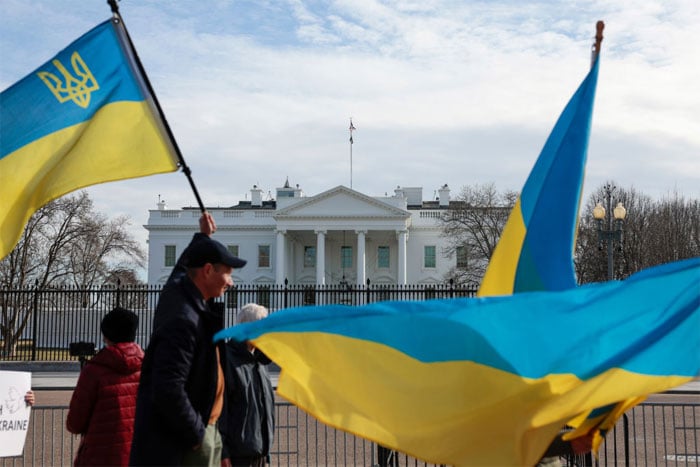 Anna Moneymaker / Staff / Getty Images
Anna Moneymaker / Staff / Getty Images To paraphrase the famous tourist slogan, what happens in Ukraine doesn’t necessarily stay in Ukraine.
Just as Vladimir Putin watched carefully as American presidents drew and then erased red lines in Syria, Afghanistan and elsewhere over the last twenty-plus years, other dictators around the world have now been paying equally close attention to the promises and threats that Joe Biden has issued as the Russia-instigated violence in Eastern Europe has increased. At the time this was written, Biden and his allies have not only held to their initial warnings, but have gradually increased the pressure on Russia through economic sanctions, military aid and diplomatic pressure. If Putin is ultimately unsuccessful in achieving his goals, it will be because the West remains unified and holds firm.
But one thing that could quickly undermine the cohesion of the U.S.-led alliance would be for Biden to waver in the face of similar bullying elsewhere on the international stage. That’s why Xi Jinping is monitoring the war so closely from China and why Kim Jong-un has resumed missile testing in North Korea. And why it’s so important for all of us to keep an especially close eye on the continuing multinational negotiations in Vienna with Iran over that country’s nuclear capability.
I should be clear: I opposed the original agreement with Iran back in 2015 based on concerns that the short-term delay to the mullahs in achieving their nuclear ambitions was an insufficient tradeoff for the considerable economic rewards they would receive. But both fans and foes of that deal should agree that reinstating that treaty in the current geopolitical climate would be disastrous. Even those who believe the benefits of a new deal outweigh the downsides should see that the timing of a new agreement would send a particularly unhelpful message to Putin, Xi and other authoritarian leaders with whom the U.S. must deal.
As the sanctions against Russia strengthen, it would be understandable for Putin to wonder if he had underestimated Biden’s resolve and his ability to hold together an international coalition. There would be no more effective way to reassure Putin that his original instincts were correct, if the America that he saw back down in Syria and walk away in Afghanistan would also decide that Ukraine is too difficult a challenge to maintain for the long haul. It’s equally easy to imagine that Xi, whose long-time goal of controlling Taiwan has looked more distant in recent days, would come to the same conclusion.
Capitulating to the demands that Iranian negotiators have now raised would send an especially damaging message to a global audience.
Capitulating to the demands that Iranian negotiators have now raised would send an especially damaging message to a global audience. Iran has reportedly made it clear that their conditions now include an end to investigations of their past violations of previous agreements and that the country’s notorious Islamic Revolutionary Guard Corps be dropped from all international terrorism lists. It’s hard to imagine a clearer signal of appeasement to America’s opponents and allies, or a worse time to send that message.
The original Iran nuclear agreements were a wrenching experience for the American Jewish community. Smart people of good faith lined up on both sides of the debate, and longtime personal and political relationships were destroyed as a result. Donald Trump’s withdrawal from the treaty and Biden’s decision to restart negotiations reopened those wounds: it’s clear that the rupture will not be healed anytime soon. But despite the deep and angry divisions over the agreement that still remain, there should be at least the possibility for agreement on questions of timing. Not now. Not until the Russian threat to Ukraine and its neighbors has subsided. Not yet. Not now.
The temptation to move ahead with Iran is understandable. The country is rapidly closing in on nuclear capability and the most effective alternative for preventing the attainment of their goals at this late hour is unclear. But if an economic chokehold is the best recipe for thwarting Putin’s evil ambitions, then it’s difficult to understand why the same approach is not the smartest way to deal with Iran’s nuclear terrorists. Not now.
Dan Schnur is a Professor at the University of California – Berkeley, USC and Pepperdine. Join Dan for his weekly webinar “Politics in the Time of Coronavirus” (www/lawac.org) on Tuesdays at 5 PM.























 More news and opinions than at a Shabbat dinner, right in your inbox.
More news and opinions than at a Shabbat dinner, right in your inbox.